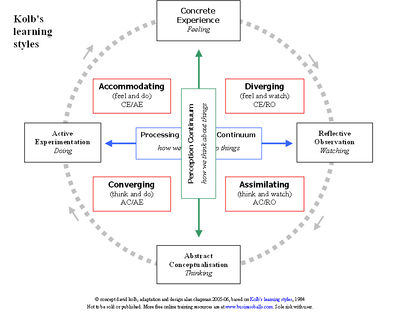Learning Models
| Learning Review | |
|---|---|
| Reflection for learning | |
| Models of Reflection | Objectives | Reflective Practice | Learning Models | e-Learning Activity |
Theories and models for learning help to frame our understanding of how we learn as teachers and also how our students learn. Reflective learning is an important component of reflective practice.
Kolb – experiential learning
Kolb (1984) proposed a model of learning that has become widely known and used as a basis for considering how we learn from experience. This is often referred to as the experiential learning cycle.
The model suggests four learning stages and style preferences whereby immediate or concrete experiences provide a basis for observations and reflections. These observations and reflections are distilled into abstract concepts producing new implications for action that can be actively tested, in turn creating new experiences. Kolb’s model has provided a basis for the development in the United Kingdom of the learning style preferences questionnaire designed by Alan Mumford and Peter Honey.
